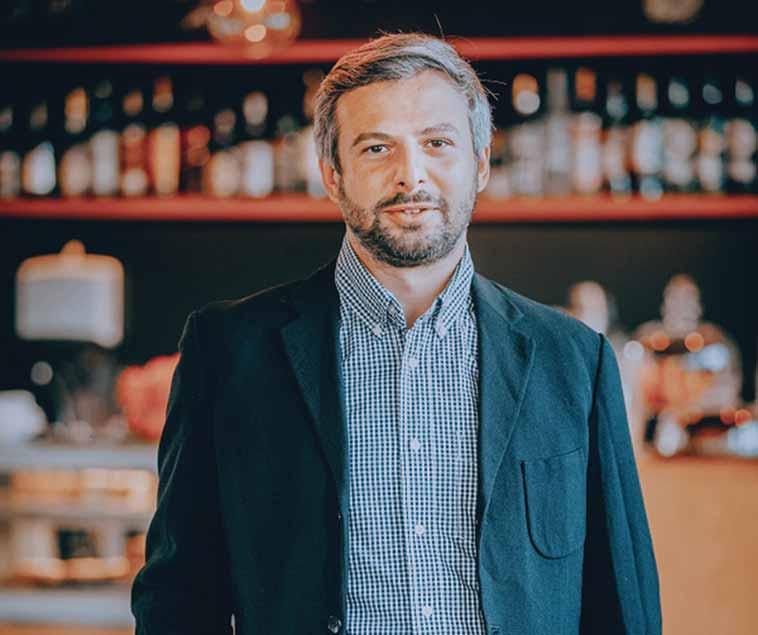
We talk to Tsavkisi Park managing partner Gegi Vasadze on Georgia's first townhouse development in the capital PAGE 7
“Putin Has a Big Asterisk on His Calendar for the US Elections. And if Trump Wins, That's a Win for Moscow” – BG. Gen. Peter Zwack
Brigadier General Peter B. Zwack (Ret.) served as the US senior defense official and attaché to the Russian Federation from 2012 to 2014, a period which included Russia’s first invasion of Ukraine. He also served in West Germany, Kosovo, South Korea, and Afghanistan. A published author, he has worked with Russian and international colleagues in multiple fields since 1989, including defense, security, academia, policy, veterans, and private citizens. He regularly consults, writes, and lectures within the interagency, defense, think tank, academic, and business sectors, and provides commentary on contemporary Russian and Eurasian security issues.
Radio Free Europe/RL’s Georgian Service sat down with him at the premises of the Rondeli Security Conference 2024, in Tbilisi.
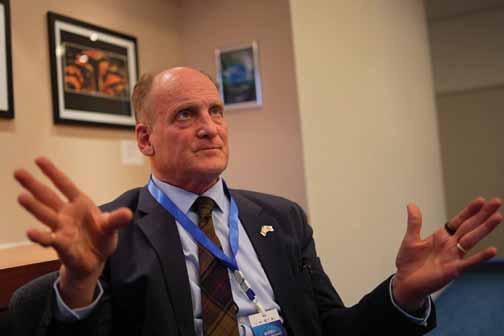
In this week’s issue...
ArtBasel: How Georgian Artists Have Put Tbilisi in the Global Spotlight
UN Expresses its Profound Concern with Re-introduction of ‘Russian Law’
Defending Their Right to Be Europeans - Georgians Protest Re-Introduction of Foreign Agents Bill
Eco-friendly Mobile School: A New Environmental Education Program for Georgian Schools
SOCIETY PAGE 8
Creating Lasting Memories with Ambassadori Travel
SOCIETY PAGE 9
Discover a Wellness Haven in Hedone
Georgian Poets: Tamaz Chiladze
SOCIETY PAGE 9 POLITICS PAGE 6 NEWS PAGE 3 CULTURE PAGE 11 POLITICS PAGE 6


PreparedforGeorgiaTodayBusinessby Issue no: 1445 • • APRIL 12 - 18, 2024 • • PUBLISHED WEEKLY
PRICE:
GEL 2.50
Continued on page 5
FOCUS ON TSAVKISI PARK
INTERVIEW BY VAZHA TAVBERIDZE
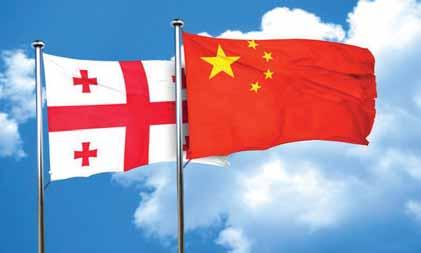
Visa-free Travel Agreement Between China and Georgia Officially Signed
BY MARIAM MTIVLISHVILI
Visa-free travel between China and Georgia has been officially signed off on. The document was signed by the Minister of Foreign Affairs of Georgia, Ilia Darchiashvili, and the Ambassador of China to Georgia, Chou Tsien. After entering into force, the agreement will allow citizens of Georgia to travel to China without a visa and stay in the country for 30 days at a time. The agreement will enter into force after the completion of internal legal procedures by the two states.
Zurabishvili: When it Comes to a Choice Between Europe and Russia, the President Can’t be Neutral!
President Salome Zurabishvili discussed the relations between Georgia and the European Union, the consequences of the Russian law, and Black Sea security issues with the delegation of the European Union Political and Security Committee.
At the meeting held in the Orbeliani Palace, touching on the situation in the occupied territories of Georgia, the delegation noted that the European Union supports the strengthening of peace and security in the region.
As the president noted, the European integration process is very important for the Georgian people and its people do share the values of the European Union.
The President’s administration reported that she called the “Russian Law,” initiated for the second time in the parliament, a challenge for the country, and recognized that adoption of the law will affect civil society.
“The destruction of the civil sector that defends the values of the European Union is Russia’s goal. When the issue concerns
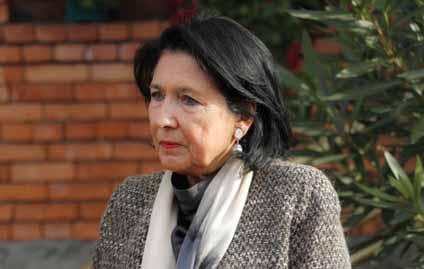
the choice between Europe and Russia, the president cannot be neutral here!” said the President. President Zurabishvili also spoke about the issue of canceling the party gender quota and noted that the current rhetoric regarding this issue in the country today is “unacceptable.”
Within the framework of the visit to Georgia, the delegation of the Political and Security Committee of the European Union held meetings in the Parliament of Georgia and with Prime Minister Irakli Kobakhidze, and also visited the boundary line with the occupied “South Ossetia” region.
Ukraine Latest: Zelensky Says Ukraine Can Win the War, 'But Shortages Do Not Advance Victory'
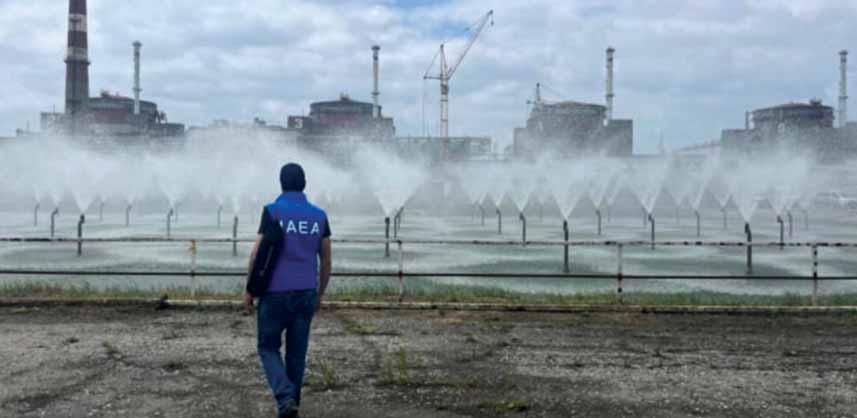
Athe main developments.
Explosions were heard in the Ukrainian city of Kharkiv early on Thursday morning as it came under Russian missile attack, Mayor Ihor Terekhov wrote on Telegram.
Separately, Zaporizhia Governor Ivan Fedorov said blasts were heard in the southern Ukrainian region, and Ukrainian media reported a cruise missile attack was underway.
Russian forces also launched deadly attacks in the south and north of Ukraine, in the Kharkiv and Odesa regions, killing seven people and injuring many more, officials said on Wednesday.
President Volodymyr Zelensky condemned the civilian deaths in his nightly video address saying, “Russian terror persists day and night at our border and in front-line areas.”
UKRAINE APPROVES MOBILIZATION
a mobi-
lization law that seeks to recruit more troops to fight back Russian forces after more than two years of war, a lawmaker said Thursday. The legislation, which tightens registration rules, narrows exemptions from military service and introduces some penalties for evaders, was approved by 283 votes.
UKRAINE ACCUSED OF ANOTHER NUCLEAR PLANT DRONE STRIKE
Officials at the Russian-controlled Zaporizhzhia nuclear plant in southern Ukraine on Tuesday accused Kyiv of a further drone attack, after an unmanned aerial vehicle allegedly fell onto the roof of its training center.
Kyiv has denied that it is behind a series of strikes on Europe's largest nuclear plant in recent days that prompted the International Atomic Energy Agency to sound the alarm over nuclear safety, and has instead accused Moscow of using the seized facility as a propaganda platform.
US State Department Spokesman Matthew Miller on Tuesday called on Russia
to end its militarized occupation of the facility and said Moscow is "playing a very dangerous game."
RUSSIAN AUTHORITIES CONTINUE TO BATTLE HISTORIC FLOODING
Russia declared a state of emergency in the Orenburg region as it grappled with the worst flooding in decades, with further flooding expected both in Orenburg and in western Siberia's Kurgan and Tyumen regions.
The Ural River overran its banks in the town of Orsk over the weekend after torrential rain burst a nearby dam, leaving the city submerged in water. More than 300 homes have been flooded and there is an order in place to evacuate more than 100,000 people as water levels in the Ural River continue to rise.
Russia's Orsk oil refinery, which has halted output after the widespread floods, declared force majeure on fuel supplies from April 8, according to a document issued by plant owner Forteinvest and seen by Reuters.
Russia's oil refineries were already
struggling with Ukrainian drone attacks and technical outages, forcing the country to ban gasoline exports, with some exceptions, for half a year from March 1.
Forteinvest said the plant had been shut to avoid ecological risks and ensure labor safety. Last year, the refinery processed 4.5 million metric tons (90,000 barrels per day) of oil.
ZELENSKY SAYS IT IS STILL POSSIBLE FOR UKRAINE TO WIN THE WAR, 'BUT SHORTAGES DO NOT ADVANCE VICTORY'
Ukrainian President Volodymyr Zelensky on Wednesday called on allied countries to deliver air defense systems and fighter jets to Ukraine in order to help better protect cities amid Russia's onslaught.
Zelensky said via social media platform
X that Ukraine also needs artillery to push back Russian forces on the frontline, and called for further pressure to be exerted on the Kremlin to prevent President Vladimir Putin "from building up his military potential."
"This is all entirely realistic," Zelenksy said, referencing remarks made in his address to the Delphi Economic Forum in Greece.
"And it only depends on our partners' political will. Putin can only use his aggression to make up for the shortage of global solutions. A shortage that has gone on for too long. It is possible to win this war. But shortages do not advance victory," he added.
EU HIGH REP, AND NORDIC AND BALTIC COUNTRIES URGE EU AND NATO TO INCREASE UKRAINE AID
The eight Nordic and Baltic nations have called on NATO to play an increased role in assisting Ukraine with military support and equipment, Swedish Foreign Minister Tobias Billstrom told a press conference on Wednesday, according to Reuters.
Billstrom was speaking after a meeting of foreign ministers on Sweden's Gotland Island, where the eight countries also agreed to convene a group of experts to aid Ukraine's effort to join the European Union.
Speaking at the Europe Forum in Brussels on 9 April, EU High Representative Josep Borrell called on EU member states to increase the anti-air defense capacities so that “Ukraine can stop the Russian missiles and their glide bombs that are destroying urban infrastructure”. He added that he would make the same call to the EU Foreign Affairs and Defense ministers in a couple of weeks, when they meet for a Council.
“We are talking about Ukraine reconstruction, but we should talk more about avoiding destruction,” said Borrell. “The best way of spending less on reconstruction is to spend more on avoiding destruction. And Ukrainians do not have the capacity to avoid destruction because, to tell the truth, we should be doing more and quicker in order to allow them to have the capacities they need.”
Borrell added that Ukrainian Foreign Minister Dmytro Kuleba had “desperately asked” him for seven Patriot batteries to defend Ukraine a few days prior.
“It should be inconceivable that we were not able to provide them, given that the Western armies have about 100 batteries of Patriot. And still, we are not able to provide the seven they are asking desperately for,” Borrell said.
GEORGIA TODAY APRIL 12 - 18, 2024 2 NEWS
Zaporizhzhia Nuclear Power Plant during the visit of the International Atomic Energy Agency expert mission in 2023. Source: IAEA via Reuters
s the war between Russia and Ukraine enters its 777th day, these are
LAW Ukraine’s parliament approved
ArtBasel: How Georgian Artists Have Put Tbilisi in the Global Spotlight
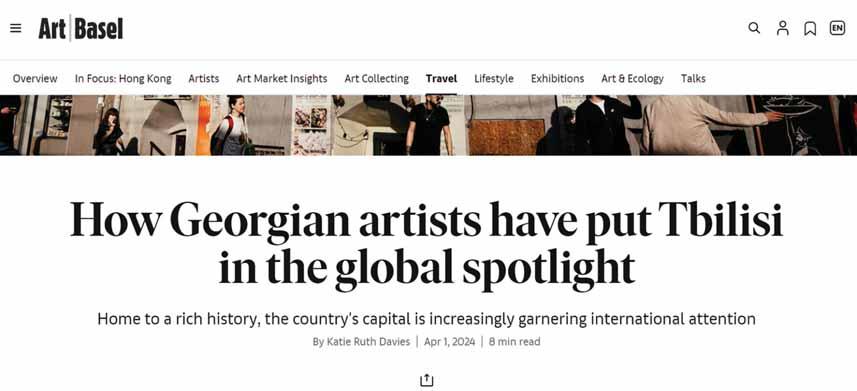 BY TEAM GT
BY TEAM GT
The Tbilisi art community has undergone a remarkable transformation, characterized by the emergence of numerous galleries and nonprofit organizations, - Lisa Offermann,
co-founder of Tbilisi-based gallery LC Queisser, tells Katie Ruth Davies in her article for Art Basel’s online portal. “Despite facing challenges such as very little governmental support and institutional backing, our community has attracted considerable global attention, a testament to our resilience and creativity.”
And so kicks off an intriguing look into Tbilisi’s contemporary art scene and the
artists contributing to that scene, whom the author notes are undoubtedly influenced not only by the wonderful juxtaposition of modern and traditional in the local architecture, cuisine and business culture, but also the painful memories and long-lasting consequences of the “dark 90s” in Georgia.
are the internationally renowned Andro Wekua, Thea Djordjadze, Anna K.E., and Ketuta Alexi-Meskhishvili, and Tbilisibased Tolia Astakhishvili, Nika Kutateladze and Beka Sakvarelidze. Indeed, the author of the piece told GEORGIA TODAY that she regrets that she didn’t have space to mention more!
“Georgia is incredibly rich in thoughtprovoking contemporary artists,” Davies tells us. “It was simply too many to name in my Art Basel article. However, as many of them are deservedly already well on their way to international fame, thanks to the numerous supporting galleries, art-, fashion- and photography fairs that draw crowds here from near and far, if you haven’t heard their names yet, you will soon!”
* * *
“Despite the daunting conditions of the 1990s…artists kept their creative drive, refusing to relent in their endeavors,” Vanda Mujiri, founder of the Vanda Art Gallery, tells the Art Basel author.
In reading the article, one discovers not only the warm hospitality and wealth of touristic opportunities offered by this small country, but also the wonderful, innovative, dark, meaningful and explorative works being shared globally by Georgia’s resilient artists. Among the names dropped
Art Basel, a for-profit international art fair, is held annually in Basel, Switzerland; Miami Beach; Hong Kong; and as of 2022, Paris. Privately owned and managed, Art Basel collaborates with local institutions in host cities to foster the growth and development of art programs. While serving as a platform for galleries to showcase and sell their work to buyers, Art Basel has also garnered a substantial international following among art enthusiasts and students. Art Basel kicked off in the 1970s when Swiss gallerists Ernst Beyeler, Trudl Bruckner and Balz Hilt created an international art fair that became an immediate, roaring success, with 16,000 visitors, 90 galleries and 30 publishers from 10 countries in attendance, setting a trend that continues today. Check out their wide selection of articles and videos online at artbasel.com.
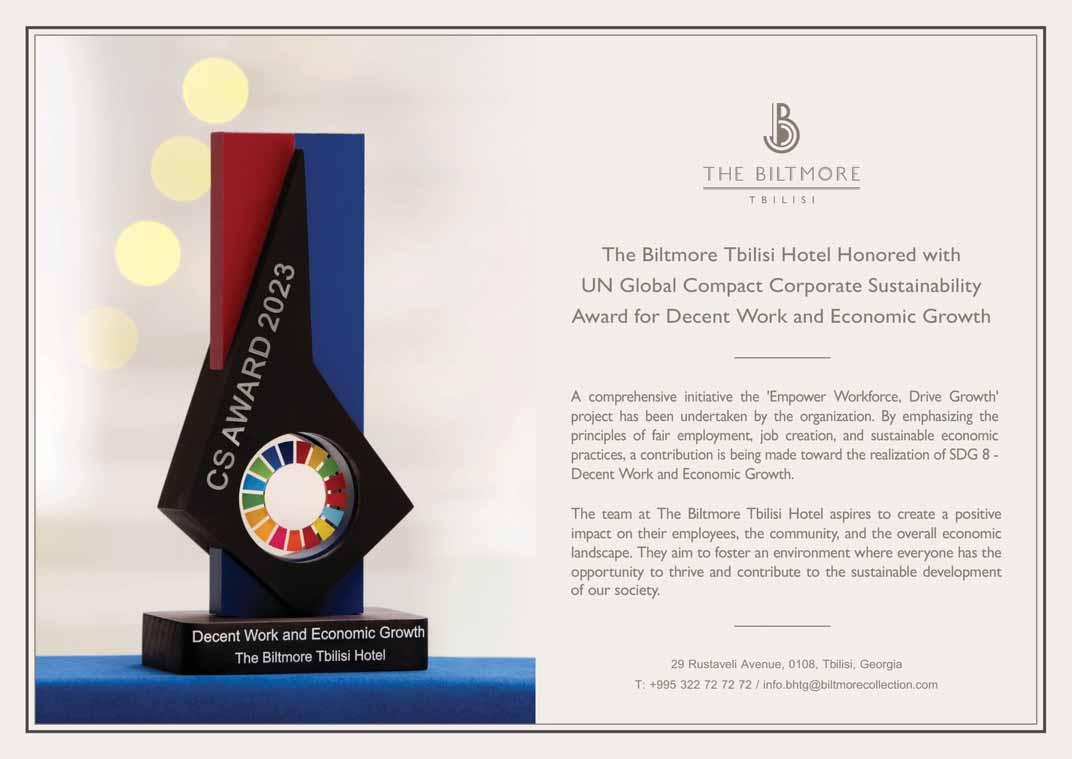
GEORGIA TODAY APRIL 12 - 18, 2024 3 NEWS
That Famous Rule of Law
OP-ED BY NUGZAR B. RUHADZE
Says Mathew Olsen, the United States Assistant Attorney General for National Security: “The Foreign Agents Registration Act (FARA) was enacted in 1938. FARA requires certain agents of foreign principals who are engaged in political activities or other activities specified under the statute to make periodic public disclosure of their relationship with the foreign principal, as well as activities, receipts and disbursements in support of those activities. Disclosure of the required information facilitates evaluation by the government and the American people of the activities of such persons in light of their function as foreign agents.”
If the above is true for what Georgia’s ruling party are trying to pass, then the analogous bill that is going to be scrutinized on various relevant floors of the country’s legislative body before it is introduced into the parliament for further treatment, needs to be thoroughly discussed in every extant detail so that nobody has any doubt about even one letter of the future law. We don’t need to incriminate each other on whether the upcoming bill is a Russian, American or Manchurian piece of regulation: We just need to sit down, peruse the text, reading into its every word thoroughly and attentively, and put on the table a pertinently, wisely and patiently performed comparative analysis of the reviled document, and only after this engage in reasonable dialog as to whether
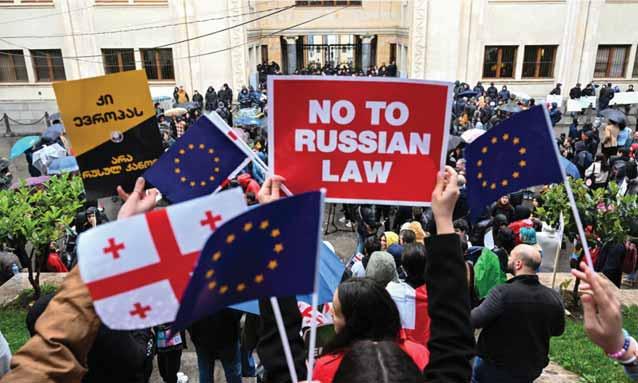
this nation needs such a law or not. Why is there so much ado about nothing until it is made absolutely clear and transparent what kind of paper we are dealing with?
No, the nation is not familiar with the full text of the presumable law. Couldn’t we take the American, Russian and Georgian texts of the project, spread them on a big round table, and read into the damned thing to do the due juxtapositions, thus killing the vain unwanted
controversy on the subject? And do so openly, on the television, with the participation of our tired and fed-up public? Why should the entire nation listen to those futile verbose clashes and incriminations between the interested politicians, whose personal attitudes have lately been so radicalized that even their own families can’t recognize them when they’re in their daggers-drawn poses in parliament.
So unimaginably simple, all that needs
to be done is to demonstrate to our nice, honest, expectant, patient and still malleable people the entire authentic content of the bill, allowing them to physically and mentally establish the equivalence or discrepancy of the text with similar texts working in other countries. No name-calling, no expletives, no cursing and dirty tricks! Just business! Isn’t it high time for us, the EU-candidate nation, to turn ourselves into something real and meaningful?
Contemporary reason dictates that in our modern times, any human movement should be full of accurate cause and consistent practicability. The great Thomas Jefferson is thought to have said that if a law is unjust, a person is not only in their right to disobey it, but is indeed obligated to do so. Granted! But we also have to be adamantly sure that the law we want to defy is truly unjust, and not needed, and for us to know the truth in that regard, we have to do our due diligence and research to know exactly what we are up against.
Wouldn’t this be healthier than wasting our valuable time on demonstrations and manifestations? Wouldn’t this be fairer than going vulgar with those scurrilous obscenities used by our “honorable” legislators as they perform slanderous attacks against each other? Why do we need any law in principle? To be more functional as a society, not viceversa!
There is always a way when there is a will. Let our lawmakers give us, the people, a true lesson on lawmaking, which the civilized world around us is used to practicing, doing so by means of versing their respective electorate, who are ready to listen to them day and night if they come out sounding wise, clear and straightforward. It is, after all, one of the strongest demands of democracy that people have the right to know from A to Z under what kind of rules and regulations the government wants them to live and work, to be familiar with every single word of any bill they want to push into law. Democracy is very easy to live by if it is used appropriately, thanks to that famous rule of law of ours.
ECHR Finds “Multiple Violations” by Russia in Georgia’s Case on Human Rights Toll of Occupation

The European Court of Human Rights on Tuesday held unanimously that there were “multiple violations” committed by Russiancontrolled forces in Georgia’s occupied regions, in a decision on a case submitted by the latter on the human rights toll of a hardening of occupation lines following the 2008 war between the two countries.
The European Court of Human Rights held, unanimously, that there had been: Violations of Articles 2 (right to life),
3 (prohibition of inhuman or degrading treatment), 5 § 1 (right to liberty and security) and 8 (right to respect for private and family life), Articles 1 (protection of property) and 2 (right to education) of Protocol No. 1 and Article 2 of Protocol No. 4 (freedom of movement) of the European Convention on Human Rights. The armed conflict between Georgia and Russia in August 2008 led to a process which started in 2009 and is known as “borderization”, blocking people from crossing the administrative boundary
lines freely between Georgian-controlled territory and the Russian-backed breakaway Georgian regions of Abkhazia and South Ossetia.
The situation has been referred to as “one of the most painful legacies of the August 2008 Georgia- Russia conflict”.
The Georgian Government alleged in particular that people had been killed while trying to enter or exit Abkhazia or South Ossetia, while others had been arrested, detained and/or ill-treated for “illegally crossing” the administrative boundary lines. People had been deprived
of land, which they used for farming, families had been separated, and children had been forced to choose between learning in Russian or making long and perilous journeys to Georgian-controlled territory to attend school.
The Court found that it had sufficient evidence, in particular lists of victims, testimonies, media reports and international material, to conclude beyond reasonable doubt that the incidents alleged were not isolated and were sufficiently numerous and interconnected to amount to a pattern or system of violation. More-
over, the apparent lack of an effective investigation into the incidents and the general application of the measures to all people concerned proved that such practices had been officially tolerated by the Russian authorities.
JUST SATISFACTION (ARTICLE 41)
The Court held, unanimously, that the question of the application of Article 41 was not ready for decision. There have been three other applications lodged by Georgia against Russia with the Court. There are also around 200 individual applications still pending before the Court against Georgia, against Russia, or against both states, concerning the armed conflict in 2008 or the process of “borderization”.
OTHER CASES
Since 2007, there have been three other Georgia v. Russia inter-State applications:
• Georgia v. Russia (I) (application no. 13255/07) concerning the arrest, detention and expulsion from the Russian Federation of Georgian nationals in the autumn of 2006. The Court’s principal judgment was handed down in 2014 and it decided on the application of Article 41 (just satisfaction) of the Convention in a judgment in 2019.
• Georgia v. Russia (II) (application no. 38263/08) concerning the 2008 armed conflict between Georgia and the Russian Federation and its aftermath. The Court’s principal judgment was handed down in 2021 and it decided on the application of Article 41 (just satisfaction) of the Convention in a judgment in 2023.
• Georgia v. Russia (III) (application no. 61186/09) concerning the detention of four Georgian minors by the de facto authorities of South Ossetia. The Court decided to strike the application out of its list of cases (Article
(a) of the Convention) in 2010.
GEORGIA TODAY APRIL 12 - 18, 2024 4 POLITICS
Monday's protest at the reintroduction of the "Russian Law" bill. Photo by Vano Shlamov/AFP via Getty Images
§ 1
37
“Putin Has a Big Asterisk on His Calendar for the US Elections. And if Trump Wins, That's a Win for Moscow” – BG. Gen. Peter Zwack
Continued from page 1
We began by asking him to recall his time in Moscow, in particular the mood there in 2014 when Russia attacked Ukraine and annexed Crimea.
“From our side, diplomatically, militarily, we knew that something was happening in the leadup to the attack - the Russian news media were showing on their history channel black and white reels of historic Crimea and World War 2, the Crimean War in the 1800s, and the Great Patriotic War. They were accusing NATO of putting a base into Ukraine. The tension was there, the troops moving around. Little Green Men, I will grudgingly say, was quite a stealth operation. And Crimea was infiltrated and occupied in a matter of a week. It happened so fast, the West just didn't put the pieces together, because it was a very brazen act. And then right on the tail end of that, the Russians started to infiltrate into Donbas. That was an ugly fight. And as an attaché, we would be out on the roads in Russia at that time, and seeing all the troops and the trains and all that moving south. And it was a very, very ugly period.
WAS THERE ALSO A MILITARY INTELLIGENCE BREAKDOWN? OR WAS IT SOMETHING THAT WAS EXPECTED BUT JUST NOT ACTED UPON?
I think the pieces were seen in different ways, but not completely put together. And there was an aspect of not believing that it was going to happen. The indicators were there. We knew early on in the Donbas fight that there were Russian regulars there, and at that point, we were quite awake to the issue. It was in Crimea that they stole the march, the way the Russians did it, this stealth infiltration I mentioned. The nickname there for the Russian troops was Vezhlivie Ludy, “polite soldiers,” and they were very careful about violence in Crimea. Reluctantly, I'll say it was well executed. And I don't think we had any idea what to do- it was a fait accompli. We sanctioned the hell out of Russia, but there were no security guarantees for Ukraine, and nobody was ready to go to war with the Russians. And the Russians knew it.
PRESENT DAY, TWO YEARS INTO THE UKRAINE WAR – WHERE DO WE STAND?
We all thought in the beginning that the Ukrainians would be overrun in weeks, yet they actually proved to be a viable, proud, born-in-battle nation. It's got flaws, issues, but this is a nation that existentially is fighting for its life, this is probably something that the Georgians understand more than just about anybody in the region, about fighting for one's life, going back to 2008. Two years into it, I’d say the Ukrainians had the upper edge until about six months ago.
I was in Kyiv back in May, with a delegation, and spoke to a number of defense and governmental officials. There was a guarded optimism about the counter-offensive. But the military guys were frank, saying, “I wish you weren't all talking so much about the counter-offensive. It's putting a lot of pressure on us.” And all the media and everybody was doing the planning for the counter-offensive for them, and then this long period waiting for the weapons. The Russians, as we have seen, were about as ready as they could be for the counteroffensive, with their massive fortifications. You can put conscripts in heavy fortifications and they'll fight better. And then the minefields. But after all this, and the beating the Ukrainian offensive, I remind people that this isn't the end of the war, the United States and its allies in World War Two in Europe, we had several reverses in our European campaign and also in Asia. Everybody’s gotten so used to the Ukrainians winning with Kyiv, Kharkiv and Kherson, I call it k-three, that when it didn't work, “oh my God, that's the end!” But it’s not. But now the Ukrainians are in a tough, grinded out stalemate, where troop power and ammunition matter. And while the Ukrainians are better and more motivated, one could say the Russian military has improved a lot. There's one thing about being beaten up and slaughtered, that those who survive learn. So the Russians still aren't very good, but they've learned a lot. They've gotten more mass along the border. They're in a 600-mile World War One type of trench line with a focus in Donbas and to the south. And the Ukrainians are holding their own, but they are in a little bit of a Russian bear hug, they're tight, they're close, lots of artillery, lots of infantry. The Russians are taking much bigger

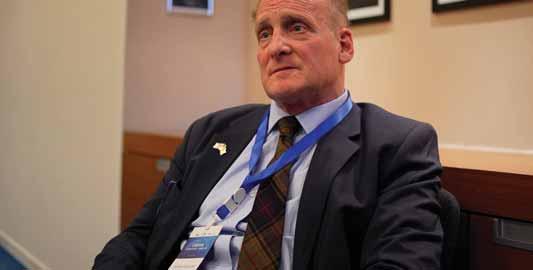
losses, but the Ukrainians are taking a lot of losses too. And then you have these extraordinary, offsetting asymmetric successes by Ukraine in the Black Sea, they are remarkable.
Two years on, this merciless invasion is as vicious as it was on day one. Ukrainians are holding their own, but we just had Avdiivka, which was a bloody fight. And the Ukrainians had to pull out from Bakhmut. These are Verdun-type fights, where they took out a disproportionate amount of Russians, but they've lost a lot of Ukrainians too, and now they're pushing towards Robotyne and some other towns. How long does the Ukrainian front hold, especially when they're not getting the ammunition and the aid that they so desperately need? This is a crisis.
In many ways, Russia looks at the Ukrainian fight as more than just a fight. They want to subjugate Ukraine. And they're trying to break the West, and Western cohesion. Putin has his legs back under him, it seems, and he's back in charge. They survived Prigozhin a few months ago and they are grinding and pushing because they have a military system that is remorseless with its own people, throwing in grunts, convicts and all that.
We are at a decision point: Who are we? What are we - Europe, expanded Europe, Eastern Europe, United States, the North Atlantic relationship, if we let Ukraine to fail or be forced into a treaty or settlement, a ceasefire it doesn't want? Then we forced them into it almost in a form of appeasement to the Russians. We don't want to go to war with Russia, but Ukraine is the line. And we just can't let them down. We need to pull together, stay together. We have major problems in my country, the US, that we've got to get through politically. Because we, I don't want to oversell it, but we set an example. And we're looking pretty confused and irresolute right now, despite the best efforts of the current administration.
IT’S BEEN 7 MONTHS SINCE THE LAST US SUPPLEMENTAL AID. HOW MANY MORE WILL UKRAINE HAVE TO WAIT?
This is sadly, in my mind, naked American politics. It's no secret that there is mostly bipartisan support for Ukraine, that there is a wing of the Republican Party and the former president that wish to see Ukraine defeated, or at least don't support it. And it couldn't come at a more critical time. I believe we will get our package eventually, but it's taken too long. I want to believe it's going to be sorted out in the next month. It's such an awful issue and situation. One of the problems the US has is that much of our population, certainly in the countryside, have not been well educated on Ukraine and what it means to them. And right now, it's painted as sucking resources and that it’s expensive; it’s increasing the cost of food and life and gas and all of that. But we suffered through this before World War Two as well; we went through isolation. It’s incredibly dangerous. It's short-sighted. It's naive. And I think that our politics are twisted. And within certain aspects of that right-wing group, the MAGA group, they're less sympathetic to Ukraine, and some of them, including the former president, even admire the Russians and Putin.
IF DONALD TRUMP COMES BACK, WHAT DOES IT MEAN FOR THE WAR IN UKRAINE?
I still hope he’ll be defeated, though right now it’s 50/50 that he will be the next president. I think we’ll retrench in some ways. Our alliances won't go away, but it will become increasingly transac-
tional again; it'll be us against them. The US may be more directive in nature. Or Trump might decide the [Transatlantic] alliance isn’t good for America, for whatever his reasons are.
This is why it's so important that we have it now, in our own law, codified, that a US president cannot unilaterally break the United States away from NATO. So there are precautionary things that are being done in Legislation and Judiciary, but it's there. What Trump may do is give the Russians motivation. I think Putin has a big, big, big asterisk on his calendar for the American elections. And if Trump wins, he believes that's a win for Moscow.
WHAT WOULD TRUMP’S UKRAINE POLICY LOOK LIKE? KEEPING IN MIND
HIS FAMOUS CLAIM THAT HE WOULD END THE UKRAINE WAR IN 24 HOURS?
I don't know. Ok, this is sheer speculation: He would
work some deal-with-the-devil peace deal. There's a strong man aspect of Trump. He may want to put muscle into it or something. He doesn't have diplomatic finesse; he sees himself as a hardcore businessman. I think it'll be troublesome. But you have a large foreign policy and large constituency in the United States that won't agree with that. So he won’t have it easy. That said, he is clearly less interested in our security relations, in Europe and Asia, in Russia and South Korea and Japan; he has a feeling that our allies are free riding on United States’ defense. So it, as a minimum, will encourage Putin to be more aggressive on the margins of NATO. And it'll shake the trust of our allies in the US, it will force the Europeans to be even tighter. I believe that Trump being president would be profoundly destabilizing, certainly in the near term, of what our long term World Order interests are.
WHAT'S HIS PROBLEM WITH UKRAINE, DO YOU THINK?
Well, I think it's a financial problem and he's not always been positive about it. To be very blunt, he was embarrassed and impeached because of his misadventure, and trying to influence Zelensky in 2020. He got called out by Colonel Alex Vindman. And people on the NSC staff said “you can't do that.” And then it came up into our congressional system and Trump got impeached. So I think that when he looks at Ukraine, he sees red, and he sees them as that whole screw-up, as a source of so many of his problems. I think he hates Ukraine, and he's behind the scenes playing the strings. I believe there's a large at heart, bilateral Republican group that are intimidated by the former president. And then, finally, there's this side of Trump that has this weird admiration for Putin. I don't know what the basis of it is, but it’s complex and murky and wrong.

GEORGIA TODAY APRIL 12 - 18, 2024 5 POLITICS
UN Expresses its Profound Concern with Re-introduction of ‘Russian Law’

RGeorgia’s international obligations.
“Noting Georgia’s current membership of the UN Human Rights Council, we urge the Parliament of Georgia to withdraw this draft law and conduct broad, inclusive, and meaningful consultations with a wide range of stakeholders on relations between the state and civil society.
“Civil society organizations in Georgia have been at the forefront of delivering essential services to the most vulnerable and helping protect their human rights.
Stigmatizing their work risks leaving persons with disabilities, internally dis-
ecalling its statement of 26 February of 2023, the United Nations in Georgia expresses its profound concern with the re-introduction of the draft Law on Transparency of Foreign Influence in the Parliament of Georgia, as it would impede the work of civil society and media and the essential contributions they make to Georgian democracy and society as a whole.
placed, minorities, older persons, women, youth and children, survivors of domestic violence and other people in need without effective assistance and support.
“The UN has been a trusted partner for over three decades, supporting the country’s development in line with Georgia’s own national priorities and assisting the people of Georgia together with
all our local partners, including civil society and media.
“We recall the findings of the analysis conducted by OSCE/ODIHR in consultation with the UN Special Rapporteur on the rights to freedom to peaceful assembly and of association at the request of the Public Defender of Georgia, that the draft law falls short of a number of
“In addition, the United Nations in Georgia expresses regret that the Parliament opted to use an expedited procedure to abolish mandatory gender quotas in parliamentary election lists. The temporary measure of a gender quota has been a long-standing recommendation to Georgia of the UN Committee on Elimination of Discrimination against Women to compensate for women’s systemic exclusion from political decisionmaking. The abolition of quotas is a step back for gender equality.
“We urge the Georgian authorities to take all the necessary steps to avoid actions that run counter to Georgia’s international obligations and that risk having a chilling effect on Georgian democracy,” reads the statement.
Defending Their Right to Be Europeans - Georgians Protest Re-Introduction of Foreign Agents Bill

On April 9, a peaceful "Freedom March" was carried out in Tbilisi, starting at the capital’s First Republic Square, moving along Rustaveli Avenue, and ending in front of the country’s parliament building. The participants of the march were protesting the violation of the promise made by the ruling Georgian Dream party a year ago and the re-initiation of the “Russian Law.”
The “Russian Law,” or “Foreign Agents Bill” appears to contradict democratic values, threatening the country's European integration, and civil society and media freedom. The goal of the march was to speak up for the country's European perspective.
"We choose Europe! Georgia will never be Russia! Let's protect the victory of April 9 together! No to the Russian law!" the description of the event read, inviting Georgians to participate.
The “Russian Law” was discussed at the session of the Bureau on April 8. The first committee to consider the bill will be the Committee on Legal Affairs in a hearing scheduled for Monday, April 15. It is said another protest will take place that day too.
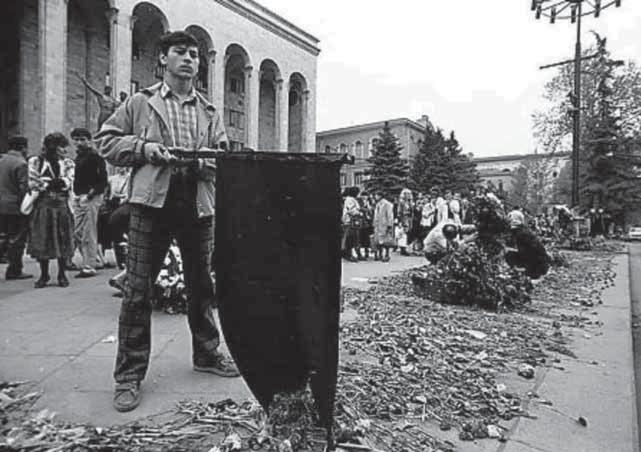
Representatives of the civil society on Tuesday moved in a crowd of hundreds towards the Parliament, with placards proclaiming: "Yes to Europe! No to the Russian law!", "We choose Europe", "Georgia will never be Russia!", "Let's defend the victory of April 9 together!".
Leaders of the opposition party, representatives of non-governmental organizations, and representatives of the cultural sphere joined the Freedom March. Those at the march carried the flags of Georgia and the European Union, and, as a sign of recognition of the historic significance of April 9, the participants were given daisies and tulips.
The 1989 April 9 Tragedy (also known as the Tbilisi Massacre or Tbilisi Tragedy) refers to when a peaceful, antiSoviet demonstration on the central Rustaveli Avenue was dispersed by the Soviet Army, resulting in 21 deaths, mostly women and youth, and hundreds of injuries caused by panic-led stampedes, the soldiers beating the participants with spades, and toxic gas.
On April 10, in protest against the onslaught, Tbilisi and the rest of Georgia went out on strike, and 40 days of national mourning was declared. People brought a large number of flowers to the place of the killings to pay respect to the deceased, particularly tulips and daisies.
A year later, on 9 April 1990, Georgia adopted its Declaration of Independence. On April 9, 1991, on the second anniversary of the tragedy, the Supreme Council of Georgia declared Georgian sovereignty and independence from the Soviet Union, based on the results of a nationwide referendum.
In the same year, one of the leaders of the protest movement, Zviad Gamsakhurdia, was named the first democratically elected President of Georgia.
“Today, we remember and honor all those who fought against the Soviet Union 35 years ago, for the independence, sovereignty and prosperity of Georgia. We support the citizens of Georgia in building a strong, free and sovereign country," reads the April 9th statement of the British Embassy in Georgia.
“I congratulate the citizens of Georgia who defend their right to be Europeans!” MEP Petras Auštrevicius wrote in response to this week’s Freedom March.
GEORGIA TODAY APRIL 12 - 18, 2024 6 POLITICS
People brought a large number of flowers to the place of the killings to pay respect to the deceased, particularly tulips and daisies. Source: FB
BY TEAM GT
The April 9, 2024, peaceful Freedom March to parliament protesting the "Russian Law." Source: FB
Townhouses - Innovation for Georgia from Tsavkisi Park
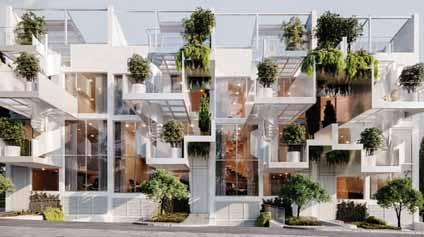 BY MARIAM MTIVLISHVILI
BY MARIAM MTIVLISHVILI
Anew residential area is being built on 12,000 square meters in Tsavkisi, just 7 minutes' drive up into the hills from Tbilisi, in a popular resort zone boasting excellent air quality and greenery. Tsavkisi Park is a new project within Tsavkisi Valley, which will unite 20 modern townhouses in the first stage which will be handed over to residents in a green frame format. The main goal of the project is to create an environment for residents where “home” means so much more than simply a place to live. For detailed information, GEORGIA TODAY offers an interview with Gegi Vasadze, the managing partner of Horizon Capital.
“Our project is being built on the territory of Tsavkisi Valley, and includes
20 townhouses. This is the last phase to complete the Tsavkisi Valley project,” Vasadze tells us. “The location makes it convenient for residents to easily cover the distance to any destination in and near the capital city. I would also like to point out that this is a place to live yearround, not just in summer.”
WHY DID YOU CHOOSE TOWNHOUSES FOR THIS PROJECT?
We started working on the project about a year ago. We used our 14-year experience as much as possible in the planning stage of the project. Townhouse type dwellings appeared for the first time in Georgia, and there is as yet no analogue of it in our country. First, we wanted to satisfy the desire of the community as much as possible; in particular, to determine the right size, based on demand, and to develop some additional value that the houses in Tsavkisi Valley did
not have. Accordingly, we have packed everything a person might need into 240-square-meter townhouses, which includes four bedrooms and a large terrace on the top floor with a pool, from which ideal views of Tbilisi can be seen. We are also very proud that each house has its own winter garden connected to the kitchen, which is practical year-round.
WHAT WAS THE MAIN
INSPIRATION FOR THE PROJECT?
During the planning of the community, the team really wanted to create a tangibly healthy project that would positively impact the quality of life of the residents. Accordingly, during the planning of the construction, our primary goal was to preserve the recreational space, integrate our buildings with nature, and create a harmonious living environment. It was essential to maintain privacy, but also to consider the values of socialization and a healthy lifestyle. We thus ended up creating a modern premiumclass complex where individual residences, ideally balanced, merge with green spaces and eco-friendly infrastructure.
WHAT MAKES THIS PROJECT STAND OUT IN TERMS OF INFRASTRUCTURE?
Exactly that healthy aspect I mentioned - that recreational space, integration with nature and harmonious living environment. Tsavkisi Valley has well-organized infrastructure. It already has a security checkpoint that regulates the entry and exit of visitors and residents, and a 5000-square-meter green space in front of it, which will be fully equipped with

sports aeas and paths, and will serve the new phase of Tsavkisi Valley.
IN WHAT CONDITION WILL THE HOUSES BE HANDED OVER TO THE NEW RESIDENTS?
In order to maintain a calm, safe, and well ordered environment in the area, the Tsavkisi Park team takes full responsibility for setting up the outdoor infrastructure and public spaces. Moreover, we are going to deliver the houses to residents in a green frame format, which means they will already feature European-made aluminum doors and windows, and a complete European wiring system. In addition, the future residents will get the bonus of a readyinstalled Smart system in their houses and remote controlled garage doors.
Work on the project will be completed at the end of September.
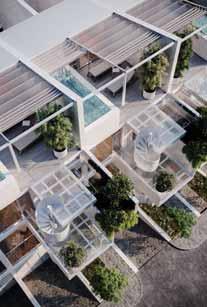

GEORGIA TODAY APRIL 12 - 18, 2024 7 SOCIETY "Tsavkisi Park" - Live Peacefully in the Center of the City A Complex of Modern Townhouses in the Territory of "Tsavkisi Valley" www.tpark.ge | +995 595 014 444
Eco-friendly Mobile School: A New Environmental Education Program for Georgian Schools
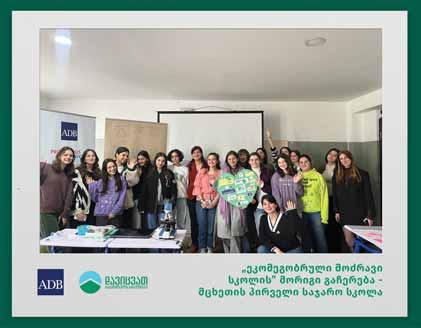 BY KATIE RUTH DAVIES
BY KATIE RUTH DAVIES
Awareness on environmental protection and the effects of climate change needs to be nurtured from a young age, particularly in school – a place where pupils get to reflect on and assess human interventions and think about ways to contribute to their communities and wider society for the better.
Eco activities are commonly practiced in many schools around the world, with the goal of bringing environmental issues closer to the attention of communities, and with this in mind, Keep Georgia Tidy, in cooperation with the Asian Development Bank, and with the support of the Ministry of Education and Science of Georgia, launched a new ecofriendly program for schools in Georgia.
‘Eco-friendly Mobile School’ is a set of learning and interactive activities designed to raise awareness about environmental challenges, to involve schoolchildren, teachers and parents in cognitive activities, and to motivate them to turn the acquired knowledge into daily action.
Within the frames of the special educational program, along with a theoretical part and practical activities, participants also experience eco-friendly opportunities and tools that significantly reduce environmental problems. Through hands-on activities, they learn how the school community can be a part of positive environmental change.
Training modules were created by specialists for the program, the content of which is based on the five priority environmental topics of the International
Eco-Schools Program: Climate Change, Biodiversity, Litter and Waste, and Energy and Energy Resources, and Water and Water resources. These are the main issues on which the new program is based and presented in schools, also taking into consideration local challenges and environmental issues.
In the first stage of the project, educational activities are being held in public schools of 10 regions of Georgia: in Racha-Lechkhumi and Kvemo Svaneti, Imereti, Adjara, Samegrelo - Zemo Svaneti, Guria, Samtskhe-Javakheti, Kakheti, Shida Kartli, Kvemo Kartli, and Mtskheta-Mtianeti. The schools were chosen in cooperation with the Ministry of Education, Science and Youth, based on needs and the available resources.
Sagarejo Public School N2 kicked off its workshop with the message “Knowing the importance of Biodiversity - it is a special power with which you can protect yourself and others.” The children there studied how biodiversity protection helps us to maintain good health, to reduce natural threats to agriculture and food security, and how it empowers us economically. Afterwards, it was agreed that they would pay greater attention to the many living beings around them, observe them and, most importantly, make their protection a daily concern.
Rustavi Public School N5 had a focus on “Eco-friendly lifestyle for less plastic and air pollution.”
Besides an interactive presentation, the participants engaged in practical work and discussed the topic, taking into account the latest research, and identi-
fied what threats environmental pollution poses to health and well-being. Students learned about modern environmental protection approaches, and analyzed how many threats exist around us, and how each of us can be involved in improving the ecological situation and taking action today.
At Gori Public School N1, the topic of the workshop was Waste Management, raising awareness about it, and encouraging eco-friendly actions. The trainer spoke with the pupils about waste management, the importance of sustainable fashion, and the secondary use of fabrics. Then the participants got to discover the concept of zero waste with the help of practical activities and to create new things with second-hand fabrics and clothes.
At Kutaisi Public School N1, KGT’s field experts introduced the participants to the natural and anthropological causes of climate change and the expected outcomes. Observing the weather with meteorological instruments was an eyeopener for the pupils, who conducted a small experiment on the dangers of global warming and then discussed how to mitigate the effects of climate change globally and locally.
The pupils of Tsageri Public School also looked into climate change and the related hazards, talking with the trainers about the causes of the climate hazards and the consequences, as well as the stages of natural disaster risk management and their importance. Afterwards, the students, together with the trainers, got involved in practical activities and evaluated the possible risks of natural disasters and learned how to protect themselves by modeling floods and landslides.
GEORGIA TODAY got in touch with two of the KGT trainers to find out more about the beneficiaries and activities carried out.
Trainer Tina Maghedani told us that before this project, she led the civil movement ‘Gavigude’ for 5 years, which fights against air pollution in Rustavi.
“Then, in 2021, I founded the organization ‘Eco Center,’ which works in the direction of environmental protection with schools, children, and teachers. Accordingly, we have quite a lot of experience in this direction, and that is why KGT contacted us asking us to get involved,” she tells us.
Trainer Eka Arsenashvili graduated from Ilia State University with a bachelor's degree in biology, then became interested in working in nature and switched to ecology and started researching wildlife.
“My main focus is arthropods, specifically insects,” she says. “There was
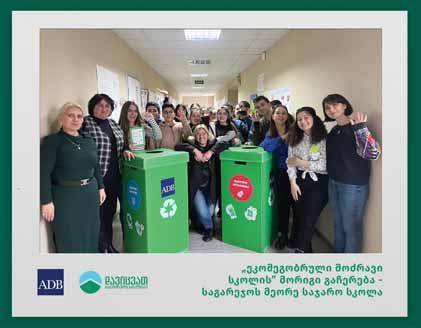
low awareness in this direction; few people are aware of these amazing creatures that need to be protected. That's why I got involved in this educational direction.”
WHY IS THIS SUCH AN IMPORTANT TOPIC TO INTRODUCE TO GEORGIA'S SCHOOL PUPILS?
Tina: In general, it is very important to raise student awareness of the environmental direction in schools, because even when working with one student, we indirectly affect the people around them. They then go and share this information with family members, peers, etc. In addition, we are facing a lot of environmental challenges in the world today, and it is very important that as many children as possible are involved in such activities.
Eka: Apart from the big cities, the regions really need promotion and help to provide the right information about the importance of environmental protection. The theme of my workshop was biodiversity as a bridge to a better future. The main focus was on local biodiversity, directly in the regions we were visiting - Kakheti and Samtskhe-Javakheti. The topics were also urban biodiversity and ecosystem services, and we discussed biodiversity issues in their region.
CAN YOU GIVE US SOME EXAMPLES OF THE "HANDSON ACTIVITIES" THAT WERE EMPLOYED, AND THE REACTIONS THESE GOT FROM THE BENEFICIARIES?
Through these trainings, they got more information about Georgia's wild species, to learn more about them, and love them. After this training, the children tell others about their experiences, share their knowledge and make others love wildlife. We teach them how to observe nature, how to take photos and post them online so our experts can help with species identification. When they feel a sense of ownership, for example, a student saw this or that species in their yard or city, they start to care for them and protect them more. They want to protect the wildlife around them.
HOW CAN THIS PROJECT BE MADE MORE SUSTAINABLE SO THAT MORE PEOPLE BENEFIT?
Tina – The training can be made more sustainable and reach more students and schools if the school community, public sector and donors are actively involved.
Eka - After completion of the trainings, we continue to communicate with the children and make sure that these trainings do not have a one-time nature, but continue to reflect their knowledge and awareness in terms of environmental protection. The project could become more sustainable with even more schools involved and with even more diversity of communities. We need to bring information on even more issues to schools to increase interest.
We can reach more students and schools if the school community, public sector and donors are actively involved
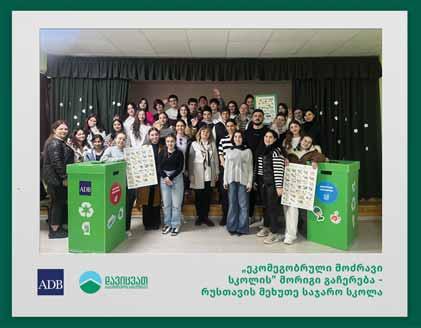
Tina - I conducted a training on air pollution, and on waste management-recycling. In addition to the theoretical part, the training included practical examples. The children were able to sort waste on the spot and take part in a quiz. It was a great way to explore environmental challenges. As it turned out, they couldn’t even imagine the seriousness of the situation, that such great damage would occur in different directions of the environment, in terms of air pollution, waste management, reduction of biodiversity, etc., and their answers were often out of touch with reality. The training module was designed in such a way that they were motivated to contribute to solving the problems. After the training, they said they would continue to sort plastic, and to spread the knowledge gained during the training in their local community and go on to set an example to others.
Eka - Our main goal was to make them interested in different living things.
Asian Development Bank is committed to achieving a prosperous, inclusive, resilient, and sustainable Asia and the Pacific, while sustaining its efforts to eradicate extreme poverty. Established in 1966, it is owned by 68 members, 49 from the region. ADB is in close collaboration with the Georgian Ministry of Education, Science and Youth to find ways to incorporate topics of climate change in the everyday learning environment of schools. Concrete steps have been identified and ADB continues its partnership with the Ministry in this direction.
Keep Georgia Tidy (KGT) is a Georgian SCO operating in the country and covering all territory of Georgia, which is actively involved in environmental activities with the aim to improve the ecological condition of Georgia and its ecosystem. One of the main directions of KGT is the development of environmental knowledge and skills among schoolchildren. Since 2020, the organization has become the local representative of the International Foundation for Environmental Education (FEE), in cooperation with whom the International Eco-Schools Program is being introduced in Georgia.
GEORGIA TODAY APRIL 12 - 18, 2024 8 SOCIETY
Creating Lasting Memories with Ambassadori Travel
BY MARIAM MTIVLISHVILI
The Ambassadori Group proudly operates four hotels across Georgia's diverse regions, including a prominent establishment in Batumi, one of the country's most popular cities. Ambassadori Travel offers a wide range of excellent services, ensuring each customer's journey is filled with unforgettable moments. With plans to introduce new travel destinations, soon customers will have the convenience of booking flights and tours both within Georgia and abroad directly through the Ambassadori Travel website. To learn more about these exciting developments, GEORGIA TODAY spoke with Salome Totibadze, the Director of Ambassadori Travel.
HOW DOES AMBASSADORI GROUP ENSURE EXCEPTIONAL HOSPITALITY ACROSS ITS QUARTET OF HOTELS?
Alongside these accommodations, our esteemed restaurant chain, winery, and other facilities contribute to a compre-
hensive travel experience. While our hotels predominantly cater to international tourists, we've encouraged our team to expand their focus, offering outbound tours to Georgian citizens as well.
COULD YOU ELABORATE ON THE SERVICES PROVIDED BY AMBASSADORI TRAVEL AND INTRODUCE US TO YOUR TEAM?
In addition to our standard services, such as flight bookings, hotel reservations, domestic and international tours, transfers, travel insurance, and visa assistance, we pride ourselves on crafting personalized itineraries tailored to individual preferences and budgets. Whether it's organizing charter flights, yacht excursions, or helicopter services, we strive to fulfill diverse travel aspirations. Presently, our team comprises 10 dedicated professionals, each certified and equipped with years of industry experience, catering to as many as eighteen corporate clients.
WHAT DISTINGUISHES AMBASSADORI TRAVEL FROM OTHERS IN THE INDUSTRY?
A key aspect of our offerings is our
focus on business tourism, catering predominantly to the corporate sector. We provide round-the-clock support throughout the journey, ensuring passengers experience unparalleled comfort and peace of mind. With our motto, “Travel like an Ambassador,’’ we embody the essence of refined travel - a memorable experience that goes beyond the ordinary, leaving guests with cherished memories to treasure.
COULD YOU SHARE INSIGHTS
INTO YOUR FUTURE PLANS?
The company is actively exploring avenues for expansion, from enhancing our technological infrastructure to diversifying our service portfolio. Additionally, we aspire to establish Ambassadori Travel representatives in multiple countries, offering our services to a global clientele.

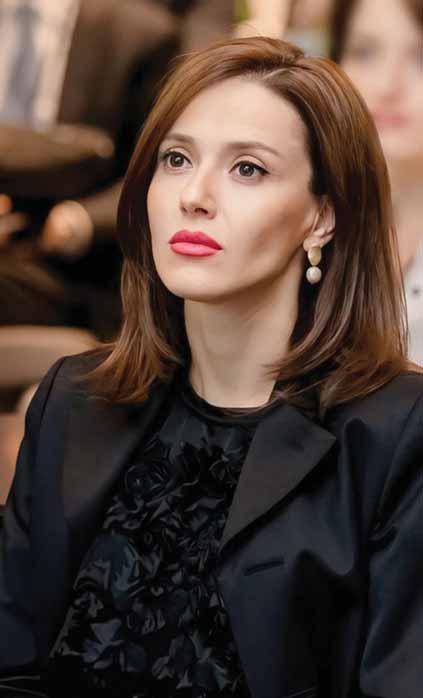
Discover a Wellness Haven in Hedone
BY MARIAM MTIVLISHVILI
Born from the idea of combating mental health issues during the pandemic, Hedone has become a wellness spot that goes beyond the usual expectations. Named after the Greek goddess of happiness, Hedone is becoming a go-to place for wellness in Georgia. What makes it different is not just the services it offers, but how everything is in one place, making it feel like a second home. This is a place that brings harmony to your mind, body and soul. Rooms are named after goddesses, like the Galatea room, where water massages are done to honor the goddess of seas and rivers.
Hedone’s team is made up of experienced professionals, ensuring excellent care for every guest through the use of top-notch European products and original devices, like a unique hydraulic device for water procedures, not used before in Georgia, with added light therapy. In short, Hedone covers all aspects of wellness.
Book an appointment for laser hair removal in Hedone and enjoy the best
Arrange a few hours of relaxation for yourself, and enjoy Hedone’s unique relaxationhealing procedures

results. Every Wednesday and Saturday you can get a 20% discount. A hydro-bath saturated with useful minerals can be found exclusively in Hedone, and there is 15% off until April 15. This is a procedure that improves metabolism, helps to model the body, stimulates lymphatic and venous circu-
lation, improves the nervous and muscular system, and, most importantly, helps the body to relax and recharge with new energy.

GEORGIA TODAY APRIL 12 - 18, 2024 9 SOCIETY
Contact information: 511 24 50 50 Digomi 7, Grigol Feradze 22b
the Director of Ambassadori Travel
Salome Totibadze,
The International Women’s Association of Georgia to Host Spring Fair at the Paragraph Hotel
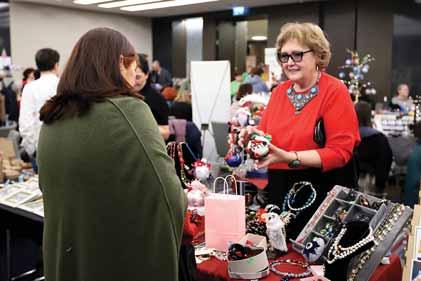 BY SHELBI R. ANKIEWICZ
BY SHELBI R. ANKIEWICZ
Georgia’s International Women’s Association (IWA) is reviving its Spring Fair, which will be held for the first time in years at the Paragraph Hotel, Tbilisi, on Sunday, April 14. This fair will be unique from the one IWA holds in the winter at the Sheraton Hotel, yet will also feature different vendors and have a children’s corner so everyone aged two to 15 can also find something to enjoy. Additionally, there will be international schools talking
about their programs, an arts and crafts space, and a tourist section to learn about expats in Georgia and the different places to explore in the country outside of Tbilisi. IWA’s Public Relations chair Silvia Mera said there will also be Georgian wine and tea, plus food on sale for guests to indulge in.
“I think the fact that every single member of the family will find something to look at and stay entertained makes it very appealing,” said Mera. “Don’t forget, also, the fact that you will be able to go and discover the Paragraph Hotel!” There will also be a raffle with various sponsors, among them Gastronome and the Paragraph Hotel, so guests can buy a ticket and try their luck at win-

European Best Destinations 2024 Names Batumi Among the Top 20 in Europe
BY MARIAM MTIVLISHVILI
The Georgian National Tourism Administration announced that the travel platform European Best Destinations 2024 has named Batumi among the 20 best destinations in Europe. The best European tourist destinations were selected by more than a million people from 172 countries of the world through this platform. The platform describes Adjara’s climate, nature, mountainous Adjara, Batumi Botanical Garden, old Batumi architecture and city life style. “History rubs shoulders with modernity, the cosmopolitan city rubs shoulders with untouched nature in one of the most beautiful regions in the world, the Adjara Region”, writes European Best Destinations.
ning a bottle of prosecco or a free night and spa day for two at the Paragraph. The Spring Fair will also highlight the organization's projects that they are currently working on, and visitors will be able to speak with members of IWA to learn more about the organization and what they do.
IWA was established in Georgia in 1996. Mera tells GEORGIA TODAY that they focus on helping individuals who don’t have access to funds when it comes to health issues but also on creating an inclusive environment for foreigners living in Georgia. The organization is open to both expats and Georgian natives.
“The organization continues to function as a safety net for expat women who arrive in Tbilisi, helping them to settle in, find their interests, mix with Georgian women, and learn about the culture and richness of their host country. We are also a charity NGO which supports grassroots organizations with a focus on women and vulnerable groups of Georgian society.”
Some of the community projects IWA is a part of include NNPL Childhood Cancer Super Heroes, the Georgian Association for Equality, The Salvation Army Georgia, and MAC Georgia. Some members of the organization also work on individual projects, assisting in support for dental treatment, liver treatment medication, and giving scholarships at the Academy of International Education Tbilisi in the culinary profession.
Currently, there are roughly 150 members of IWA, and there is a regulation that only 20-25% of them can be Georgian. Anyone can apply and sign up; however, there is a yearly registration fee and each person interested needs to be sponsored by someone who is already a part of the organization. The funding goes toward assisting individuals through charity projects and helping expats integrate through events such as culinary experiences, holiday-themed events, weekly coffee meetups, etc.
The Spring Fair was introduced by Mera after she did a tour of the Paragraph. She thought it was the ideal spot because of its central location in Tbilisi, and the fact it’s so new to most people. She became a member of IWA after moving to Georgia in September 2023, and after participating in the Winter Fair and seeing how happy everyone was, she thought it would be great to
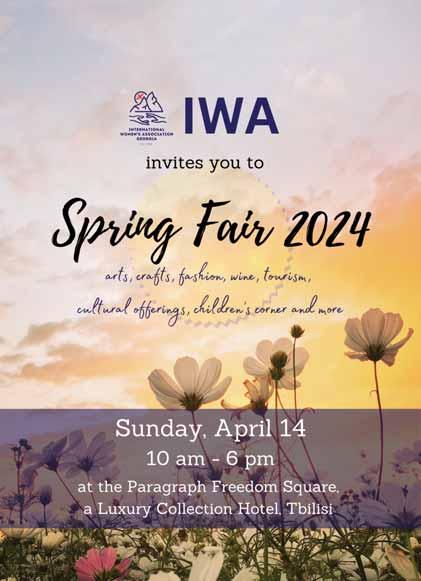
host another fair in the springtime. “This is fantastic. It’s a great location for a fair. I heard that IWA used to have a welcome dinner for all the new members along with a spring fair,” said Mera. “Then for me, it just clicked together: We needed a spring fair at the Paragraph.” Both Mera and another, newer, member of IWA, Anna Jewell, are co-coordinators of the event. Mera tells us how everyone in the organization is putting in 100% effort with decorations and contacting vendors to make the event work and be successful, so that it can
become an annual event.
“I’m very impressed with how well it is organized and the enthusiasm of its members,” wrote Jewell in an email. “I am sure that our visitors will be able to enjoy all the fair has to offer, knowing that all the funds raised will be used to benefit those in need here in Georgia.” Entrance will be free for attendees, and all the money raised from the raffle and donations will be dispersed amongst the organization's projects. This fair will be smaller than the Winter Fair due to space, yet, it is still expected to have a good turnout due to its location.
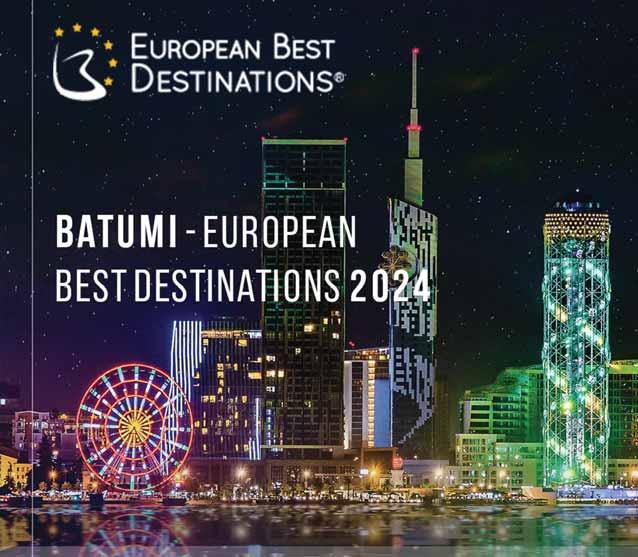
GEORGIA TODAY APRIL 12 - 18, 2024 10
SOCIETY
Poster of the upcoming Spring Fair at the Paragraph Hotel. Image provided by Silvia Mera
The Stories We Carry
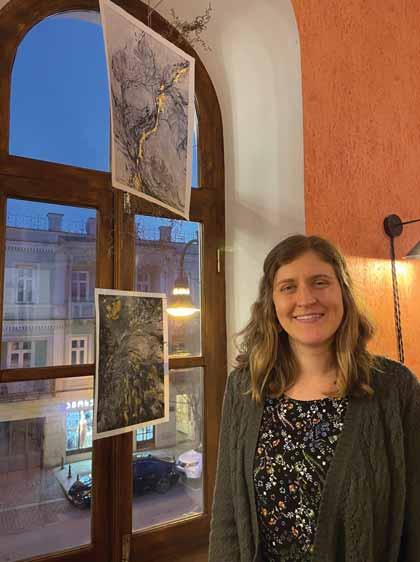
There is a new two-week art exhibition, “The Stories We Carry”, worth checking out at The Exchange/Corner House Coffee on David Ahmashenebili Avenue. This time it features only women artists: Grace Eads, Olivia Masumova, Lydia Hrenuic and Elizabeth Stunt. I was at the well-attended opening to see the work and meet its creators. These four have been artists in residence, each pursuing her craft, for some months, in a program run in the same
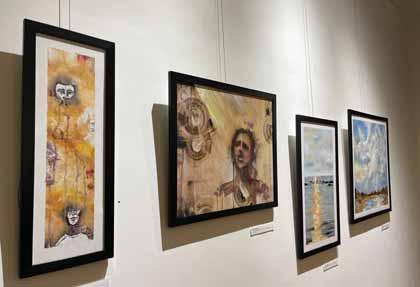
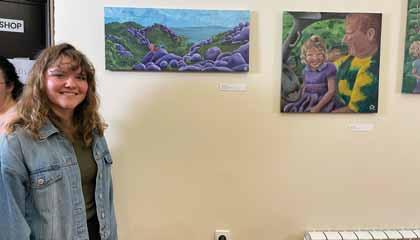
location by Unsung Arts. This show is a presentation of their portfolio work from this residency. Three sets of paintings and a film are on display, all beautiful and very different from each other.
Grace Eads grew up partly in East Africa, and her paintings are of fond memories from this time, in a set called “Close Even When We Are Far”. Having spent some time in Georgia, she is about to “leave the nest” and go back to her other homeland of America to begin university studies. There will be an adjustment for both her and the family, of course. I can relate to her painting of her and her siblings playing in a mango tree: with me it was climbing our family’s avocado tree, in Zimbabwe.
Olivia Masumova’s eight oil paintings are collectively called “The Light Inside”. Each of them portrays a different emotional state and story, encouraging viewers to consider their own journey towards light. These paintings are symbolic, and are balanced between Eads’s more realistic ones and Hrenuic’s more abstract offerings.
Lydia Hrenuic’s group, featuring both paintings and carefully balanced wire sculpture mobiles, is called “Between Mending & Mystery”. Here, she likens her work, and people’s lives, to a palimpsest, a layered document with texts or images on top of one another reflecting different periods of time. This represents her own search for resolution from her memories and experiences. Her pieces are the most abstract in the show, delicate ink and gold leaf compositions which look quite different when lit from front or back, as daylight from the windows reveals.
Elizabeth Stunt’s short film had its premiere at the opening evening. Called “Learning to Live”, it features a few young Americans interacting in a couple of apartment locations in Tbilisi. As a first film, it’s a fine effort, and I found myself thinking about the animated films which I hope will be emerging from my Svan fantastic tales: So much work! Daunting, a huge learning process, unlikely to have been finished (says the filmmaker) had she known how much work would be involved. But here it is. I wish all the artists success and continuation of their art, of which this show is only a glimpse of hopefully much more work yet to come.
https://www.caucasuscultureexchange.org/ home/cornerhouse 109 Davit Aghmashenebeli Avenue, Tbilisi, Georgia, floor 2 Open Tuesdays through Saturdays 11 am-7 pm Email: hello@caucasuscultureexchange.org
Tony Hanmer has lived in Georgia since 1999, in Svaneti since 2007, and been a weekly writer and photographer for GT since early 2011. He runs the “Svaneti Renaissance” Facebook group, now with over 2000 members, at www.facebook.com/groups/ SvanetiRenaissance/ He and his wife also run their own guest house in Etseri: www.facebook.com/hanmer.house.svaneti
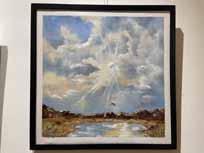

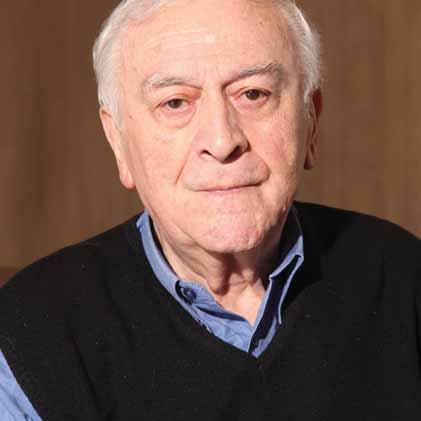
Georgian Poets: Tamaz Chiladze
Tamaz Chiladze was born in 1931 to a family of an economist and a writer, in Signagi, Georgia. Elder sibling of writer Otar Chiladze, he himself became a distinguished writer, dramatist, and poet, renowned for his literary contributions. He completed his education at the Department of Philology of Tbilisi State University in 1954. The same year marked the publication of his inaugural collection of poems. His literary journey began with the publication of his first story, ‘Taking a Walk with the Pony Phaeton,’ in Ciskari magazine.
In 1965, his play ‘The Aquarium’ debuted at the Rustaveli Theater, earning recognition as a significant addition to Georgian classical dramaturgy. Chiladze credited his mother, also a poet, as his first critic.
Chiladze's literary works have been translated into numerous languages, and he has received numerous prestigious awards, among them the Shota Rustaveli National Prize and the First Prize of West German Broadcasting for his radio-play ‘The Paradise Quartet.’ He died in 2018.
Eucalyptus and magnolia... With their cool shade On me, Is it your hand?
I don't think so, No, I haven't even thought Of it,
Eucalyptus and magnolia
And the seagull Flutters over the sea.
* * *
Bamboos in the forest, Resemble the rain, Making noise with Their heels, With emerald dresses
And tinkling earrings, Bamboos resemble rain –These pearl beads...

GEORGIA TODAY APRIL 12 - 18, 2024 11 CULTURE GEORGIA TODAY PUBLISHER & GM George Sharashidze COMMERCIAL DEPARTMENT Commercial Director: Iva Merabishvili Marketing Manager: Natalia Chikvaidze EDITORIAL DEPARTMENT: Editor-In-Chief: Katie Ruth Davies Journalists: Ana Dumbadze, Vazha Tavberidze, Tony Hanmer, Nugzar B. Ruhadze, Mariam Mtivlishvili, Erekle Poladishvili, Shelbi R. Ankiewicz Photographer: Aleksei Serov Website Editor: Katie Ruth Davies Layout: Misha Mchedlishvili Webmaster: Sergey Gevenov Circulation Managers: David Kerdikashvili, David Djandjgava ADDRESS 1 Melikishvili Str. Tbilisi, 0179, Georgia Tel.: +995 32 229 59 19 E: info@georgiatoday.ge F: GeorgiaToday ADVERTISING & SUBSCRIPTION +995 555 00 14 46 E-mail: marketing@georgiatoday.ge Reproducing material, photos and advertisements without prior editorial permission is strictly forbidden. The author is responsible for all material. Rights of authors are preserved. The newspaper is registered in Mtatsminda district court. Reg. # 06/4-309 Bamboo in Shekvetili. Source:
TRANSLATED FROM GEORGIAN INTO ENGLISH BY KETEVAN TUKHARELI
argotourbatumi
Tamaz Chiladze
BLOG BY TONY HANMER
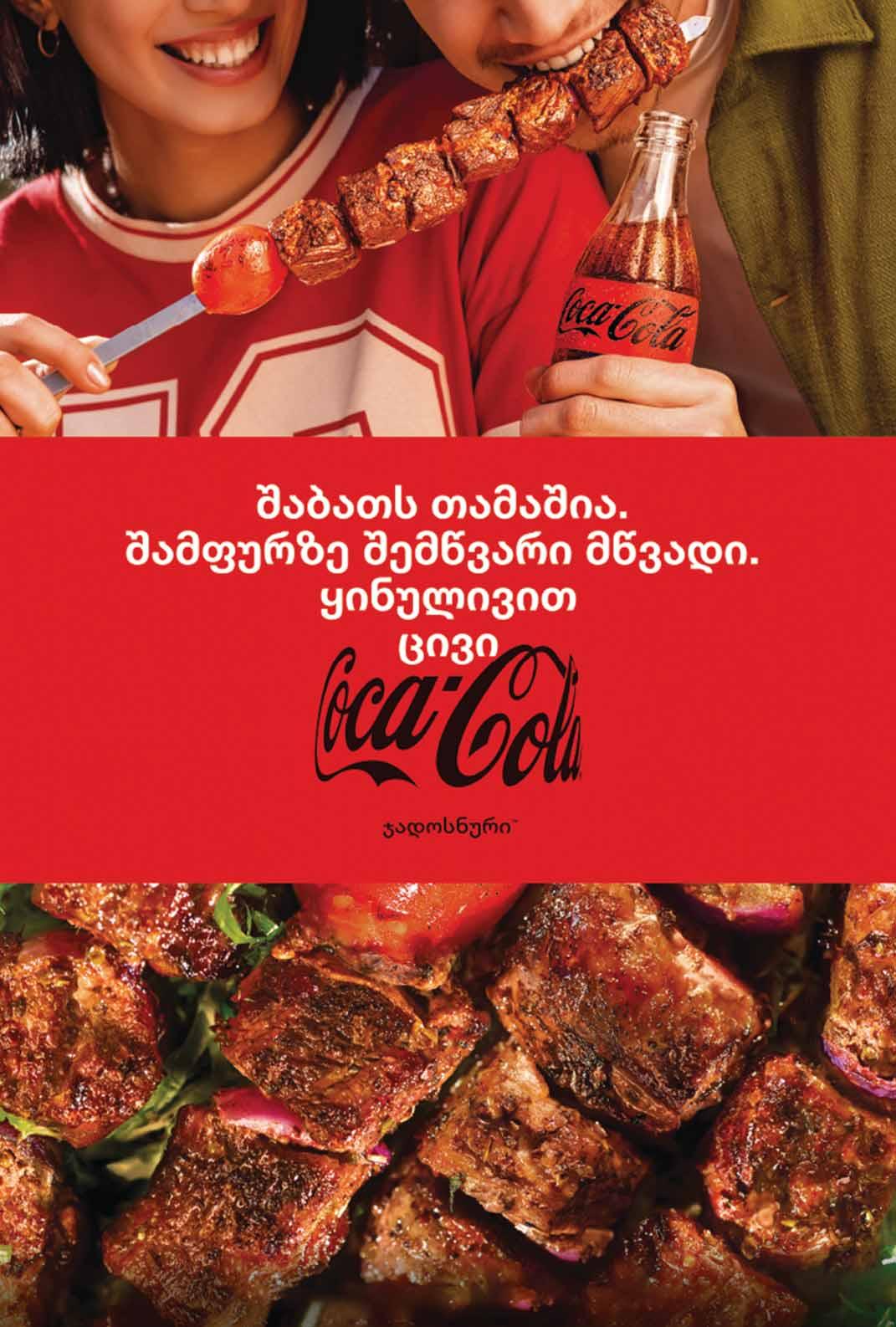






 BY TEAM GT
BY TEAM GT









 BY MARIAM MTIVLISHVILI
BY MARIAM MTIVLISHVILI



 BY KATIE RUTH DAVIES
BY KATIE RUTH DAVIES






 BY SHELBI R. ANKIEWICZ
BY SHELBI R. ANKIEWICZ










